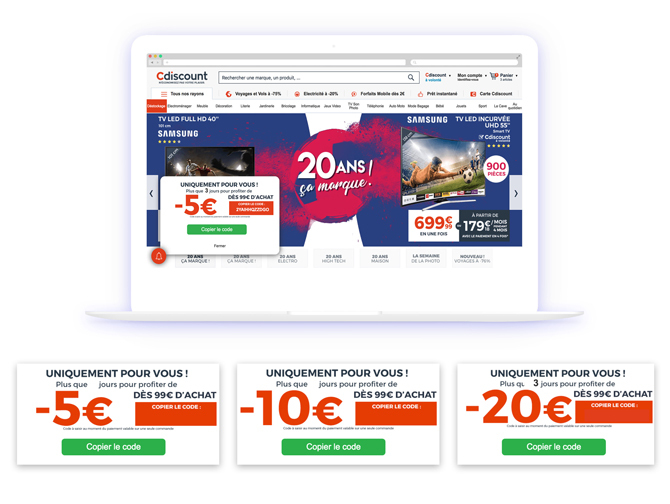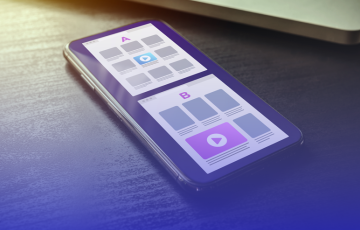
Accelerating business success post-lockdown with AI-driven personalization
While the situation remains fluid, lockdowns are being lifted in many US states and relaxed in multiple countries around the world. For example, consumers in the UK are now able to leave home to go to work and some new categories of shops are now able to open.
Clearly, remaining alert and vigilant is vital. At the same time the relaxation enables brands across multiple sectors to increase their activities and offer experiences that are adapted to the new normal while boosting conversions and revenues.
Web personalization, and in particular personalization based on AI and predictive algorithms, is the perfect solution to help brands meet the challenges of the current crisis, providing the ability to quickly boost online marketing activity, increase income and reduce costs.
This article therefore outlines some key use cases for the current scenario, for brands in the following sectors:
1 How AI-driven personalization adapts the experience to new consumer behavior
The digital channel remains essential
During the lockdown, online has been one of the only ways for consumers to interact with many brands, leading to greater digital usage, particularly from those who’d previously focused on offline channels. These new habits are likely to remain in place going forward.
The impact of COVID-19 on current and future digital consumer trends.
Consumer research carried out by Kameleoon across five countries in May 2020 backs this up - there has been a digital shift that won’t be reversed post-lockdown. In the US for example:
- 29% of respondents said that they’d increase their use of online channels.
- 73% said that the digital experience on provided during lockdown impacted their relationship with brands, changing who they bought from, and how much they spent in the future.
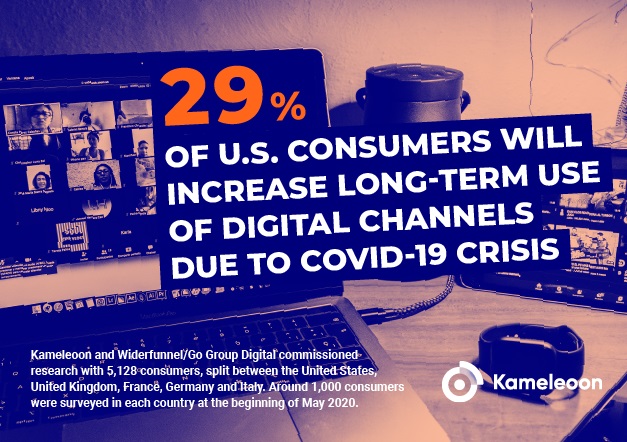
Read our article to see the global survey results and the lessons for brands.
The key finding is that brands must focus heavily on digital channels and, above all, deliver a personalized experience if they want to boost sales and quickly restore their revenues.
Fulfil your goals using AI-driven personalization.
In the current crisis context, AI-driven personalization provides a fail-safe method for digital teams to achieve their goals.
The predictive algorithms employed within personalization deliver the ability for marketers to quickly ramp up their activity and drive results.
These algorithms collect and analyze large amounts of data in real-time, allowing brands to identify a visitor’s probability of converting or their level of interest in a particular type of product.
This means that marketers can better target their marketing actions and meet visitors’ expectations when they are on their site.
There’s a double advantage. Firstly, visitors convert more because they are better guided on their purchasing journey and have a better experience, while secondly marketers reduce promotional costs as their campaigns are only displayed to the visitors most likely to convert, increasing profitability.
Kameleoon is an AI-driven personalization and A/B testing platform for product owners and marketers wishing to boost conversions and maximize digital revenues.
Our AI-driven personalization solution enables clients to automatically trigger individualized experiences based on the real-time evolution of the conversion probability of each of their visitors, more accurately meeting their needs.
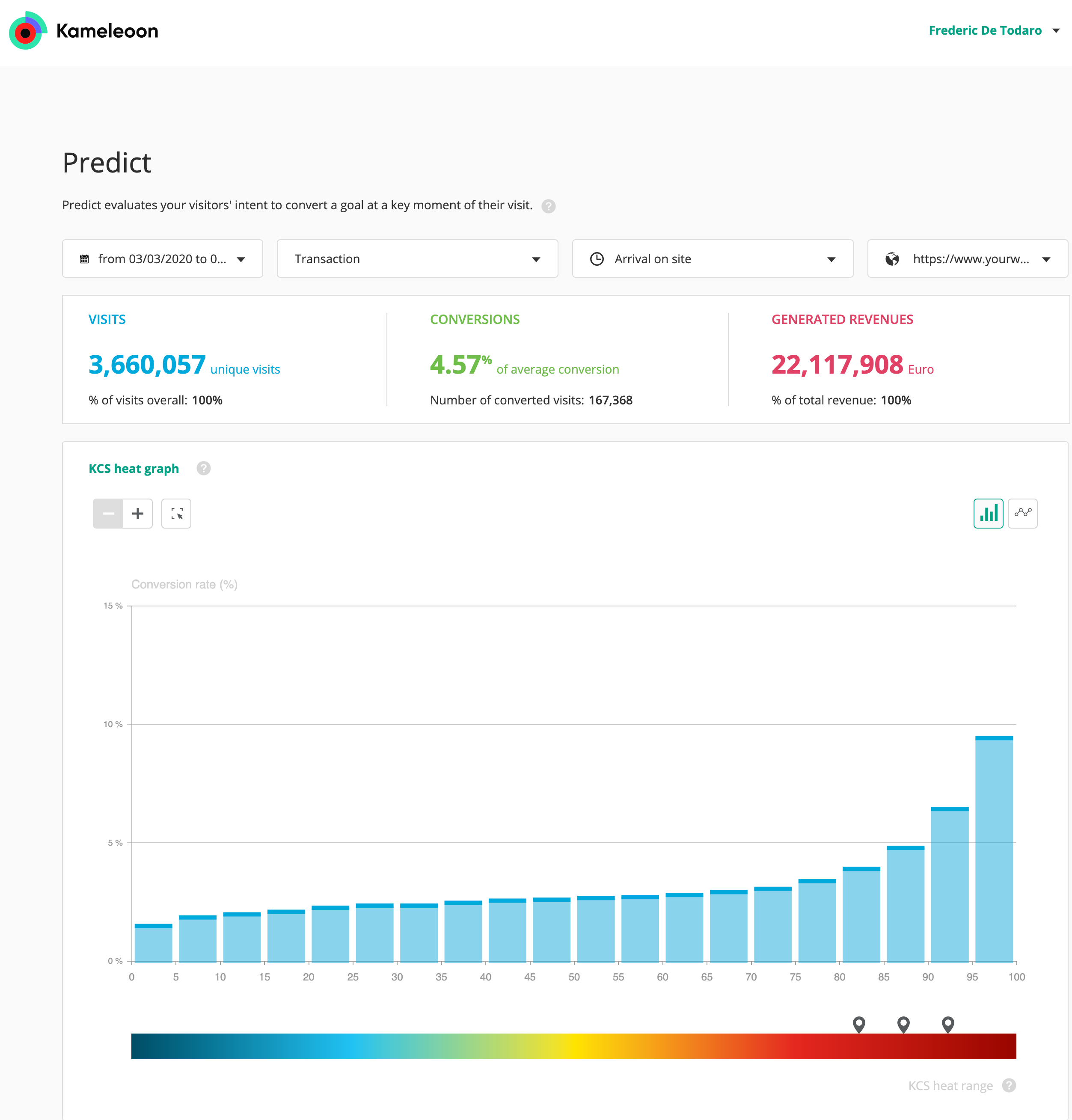
The Kameleoon Conversion Score™ (KCS™), the performance indicator used by our AI-driven personalization platform, enables marketing managers to understand the data analyzed by the algorithm from a sales point of view. It automatically suggests those ranges with the most potential for conversion and uses a flag to signal the most valuable opportunities.
Marketers can then focus on taking actions that add the greatest value, driving an immediate impact on conversions.
2 Industry specific use cases to move forward post-lockdown
Having been in close contact with our clients over the course of the past few months, we understand the desire to step up activities as regulations change.
Although their individual objectives may differ, brands in every sector can benefit from AI-driven personalization to increase their turnover.
However, for real success it is vital to deliver relevant experiences that match the current context for your consumers. These example use cases therefore aim to help you create an actionable strategy for your own activities.
Use cases for the e-commerce sector:
As business resumes, and competition from offline channels increases, e-commerce websites must find ways to boost sales and keep engagement with their clients and visitors.
AI-driven personalization enables you to achieve this, growing sales while optimizing costs.
Discounts targeted at undecided visitors
Kameleoon’s predictive targeting enables you to only offer discounts to those visitors that are undecided about making a purchase. These are the visitors ‘in the middle’ - between those that have too little inclination to buy (low purchasing probability), and visitors that are already ready to buy (a high purchasing probability).
Adopting this approach enables you to maximize the return on investment (ROI) of promotional campaigns. You can generate additional turnover 2-3 times higher than it would be with a random discounting campaign or with targeting based on manual criteria, for the same budget.
Thanks to discounts, undecided visitors who were unsure about buying are now more likely to convert. Basically, you are increasing sales while reducing campaign costs, since discounts are not offered to visitors who would have purchased anyway without needing a coupon.
This is an example of what Cdiscount does on its website, offering discount coupons for different amounts based on the visitor’s degree of indecisiveness. To find out more, check out our success story.
Adapt promotions and flash sales
Predictive algorithms are able to detect a visitor’s purchasing intention in under 15 seconds, and then tailor offers and promotions based on the products likely to be of most interest to individual consumers.
Unlike manual segmentation, which relies on pre-created criteria, predictive algorithms are based on the visitor’s purchasing intention at the time of their visit. This eliminates the risk of, for example, offering a visitor a discount on a television because they bought one a week ago.
Maternity and children’s clothes retailer Vertbaudet has seen a 20-30% increase in its conversion rate by adopting this approach.
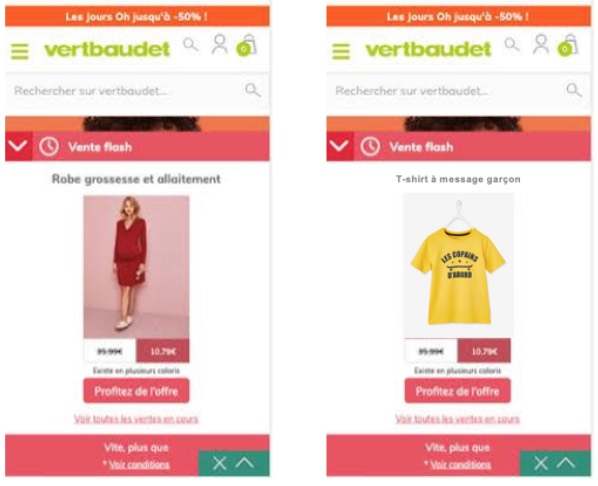
Implementing this kind of campaign takes no more than 2-3 weeks (including the learning time for the predictive algorithms). Kameleoon’s reporting and dashboard functionality enables you to monitor performance at all times. This enables you to adjust your targeting criteria to optimize the scale and reach of your campaign over time, based on the changing environment.
Use cases for the media sector:
Over the past weeks, traffic on media websites has risen significantly. A study by Neil Patel tells us that the sector has seen traffic increase by 35% whereas most other sectors have seen decreases.
This high traffic must be exploited and browsers turned into long-term subscribers. The challenge for media brands is therefore audience retention.
Reorganize the homepage according to the subjects that interest visitors
Thanks to Kameleoon’s predictive algorithms, it is possible to determine visitors’ interests to offer them adapted content that will encourage them to come back.
Media brands can therefore personalize the homepage according to what most interests the visitor:
- Reorganize the slider with the most relevant articles and content showing first. You could also prioritize video content over a written article for visitors who are more interested in this type of story.
- Adapt the listing of articles or content using categories (news, politics, economics, etc.) that correspond to the visitor’s interests.
- Reorganize the navigation menu to prioritize the most relevant categories.
This type of personalized experience has an immediate impact on advertising revenue as well as subscriptions.
Media websites should therefore seize the opportunity and implement experiences that will enable them to get the most out of their current high website traffic.
Increase subscriptions
For media websites, subscriptions are a significant revenue source, meaning brands are always looking to encourage visitors to subscribe. Here too, current high traffic should be utilized, with efforts made to convert the maximum of visitors possible.
With AI-driven personalization, visitors who are hesitating about committing can be presented with subscription offers: for example, a free special edition for any subscription taken out before a certain date. This will enable you to recruit new subscribers in a short period of time.
You could also increase visitor conversions by offering premium subscriptions to visitors with a high probability of converting. For example, if the visitor is interested in a digital subscription, they can be offered the premium version with access to print editions as well.
In this way, the conversion approach is optimized for each visitor profile. The experience of those who are not ready to buy is not marred and other visitors enjoy the best deals based on their interests.
Use cases for the automotive sector:
The pandemic and lockdowns meant that car distribution channels were frozen and dealerships closed. Many consumers found their purchase plans put on hold, or even in some cases found that their newly-bought vehicle was stuck at a dealers or warehouse.
The crisis has increased the importance of the digital channel to automotive, meaning that automotive brands must therefore ensure that they are anticipating and meeting consumer needs online.
Offer personalized test drives to visitors with a high probability of purchase
Automotive brands face two challenges: boosting sales while regulating visits to dealerships, where they are open.
Predictive personalization enables you to identify how interested each website visitor is in a particular type of vehicle, as well as their conversion probability.
You can then just offer test drive requests to those visitors with a high probability of converting, thus generating the maximum number of qualified leads for dealerships.
This will enable car brands to control both visits to dealerships and, as the leads are more qualified, a greater percentage of these appointments will be profitable.
Before the crisis, Toyota used predictive personalization to double the number of qualified leads generated for its dealers.
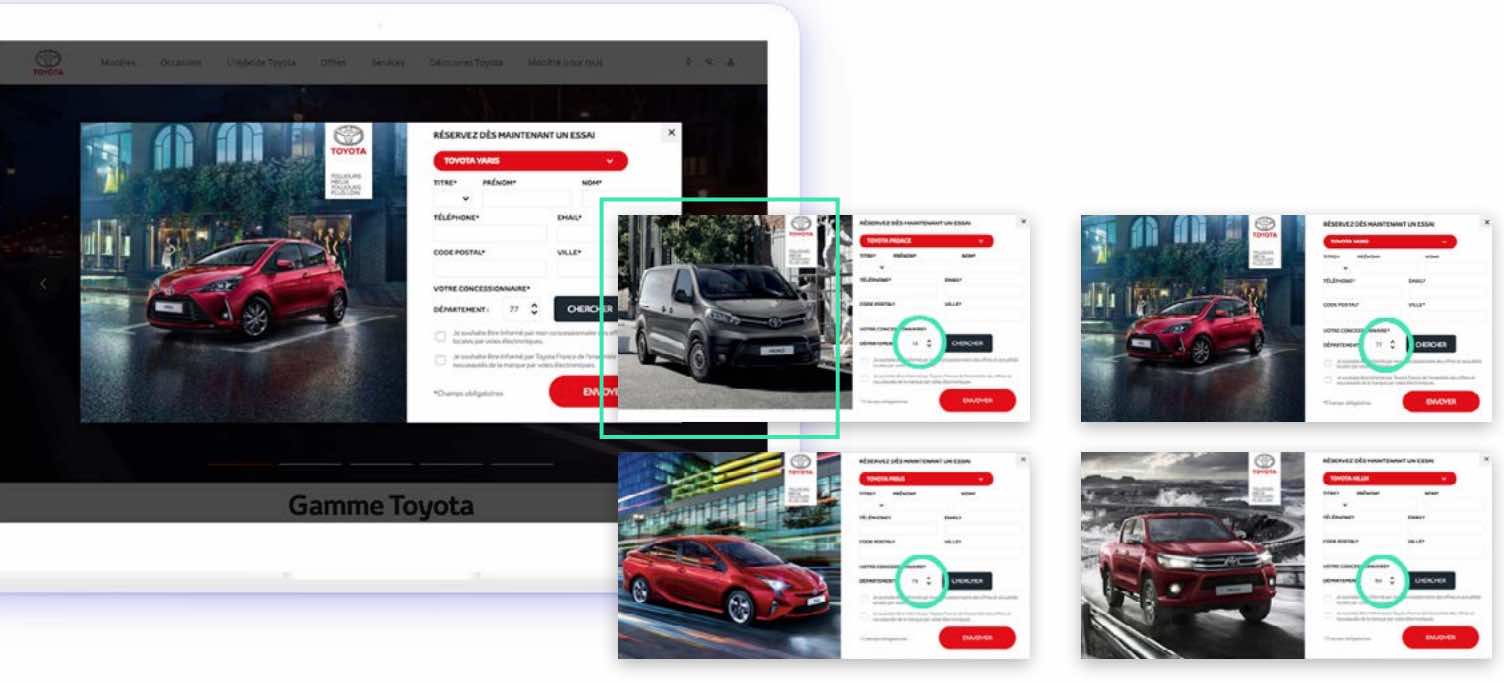
Support visitors who are not yet ready to buy
The previous example explained how automotive brands could improve the purchase journey of visitors with a high conversion probability.
However, other visitors with earlier stage plans to buy a new car should not be neglected. The digital channel and predictive algorithms can be used to reproduce the guidance a dealership advisor provides at all stages of the visitor’s purchasing journey.
With AI-driven personalization, brands can trigger the most appropriate action depending on where the visitor is in their purchasing journey:
- for “cold” visitors (who are just beginning to start to research): display a brochure download pop-in about the vehicle they are most interested in, to give them all the technical information they need.
- for “warm” visitors (who are well into the purchasing journey but not yet ready to buy: offer access to an online configurator to personalize the vehicle that has caught their eye.
This approach enables automotive brands to use the digital channel to support visitors and engage with them despite the current situation.
We delivered this personalized approach for Toyota using Kameleoon Predict.
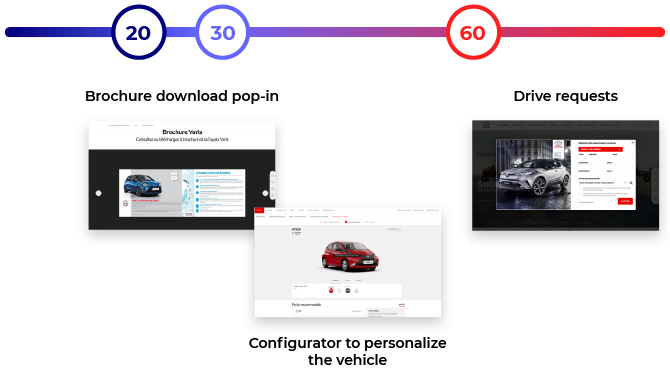
Use cases for the travel and tourism sector:
The travel and tourism sector has been hit hard by the lockdown and closing of borders. Even now, as the lockdown begins to lift, we still don’t really know when we’ll be able to travel freely or when borders will reopen.
Travel websites are still offering the possibility of booking with a guarantee of being able to easily postpone or cancel the trip. Here are examples of use cases to maintain a connection with your customers during this uncertain time.
Help visitors prepare for their trip
This is not the right time for long trips, but since consumers are limited in their activities they have more time to make plans. Many of us are dreaming about our next holidays and with time on their hands, people will want to research and plan their next trip.
To support these consumers make it easy for them to find all the practical information that they need on your website. Moreover, this will enable you to build a relationship with these visitors and to present them with more information or a booking request pop-in when they are ready.
Kameleoon’s algorithms can detect a visitor’s interest in a type of trip or destination. This then makes it very simple to contextualize the visitor’s experience with content and tools that enable them to look ahead to their future break:
- Create a tailored homepage about the destination (pictures, videos, articles, resort information page, etc.)
- Showcase social proof comments about the trip
- Display the "Top resorts" in the geographic area that interests the visitor
With this kind of experience, an immediate increase in conversions is generally noted, since visitors are better guided along their purchasing journey.
When the visitor is ready, they can be shown a simplified information request pop-in with an overview of the chosen trip and additional services based on their needs.
Optimize web-to-call
Preparing a trip can be complex and currently consumers are not able to visit a travel agent for a face-to-face discussion around their plans.
Clearly offering a telephone helpline can provide an alternative channel. However, not all visitors are interested in this, and many want to book their trip online.
Kameleoon’s predictive algorithms are capable of identifying the visitors who prefer the “telephone” channel. It compares the profile and behavior of visitors arriving on the website with those of visitors who have already converted through this channel and can then determine their degree of interest in using the telephone.
Relevant visitors are then asked if they would like an advisor to call them back, thus increasing the conversion rate for call-back requests.
Use cases for marketplace platforms:
Restore the buyer/seller balance
Marketplace platforms are based on a balance between buyers and sellers. We know how to quantify the distribution of each at any time using the following formula:

This enables us to identify which category (sellers or buyers) we should focus on to ensure equilibrium.
With Kameleoon, marketplaces can identify whether a visitor has the profile of a seller or a buyer, even if they are not signed in, and then personalize your website based on this information.
This is a significant advantage in terms of being able to target actions towards one group or the other depending on your business needs.
For example, if you see a decrease in buyers on your website, you can display a pop-in to visitors identified as “buyers” with a time-limited discount coupon on any purchase. This enables you to recruit more buyers over a fixed period and restore balance between the categories.
Of course, it is possible to adjust this experience at any time if, for example, you note a decrease in sellers.
Obviously, this list of use cases is not exhaustive. Every brand has its own challenges and needs, which is why Kameleoon’s solution is built to adapt to all use cases, whatever your sector. If you would like to discuss your personalization projects, don’t hesitate to get in touch with one of our customer success team, who will be happy to help you.

